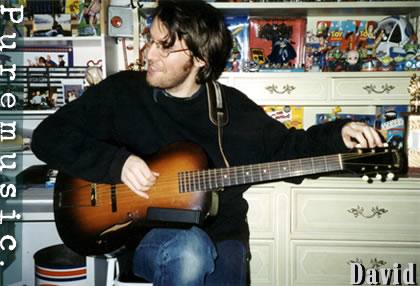
THE GHOSTLY
ONES
by Alec Wilkinson
David Rawlings told me Gillian Welch's life story. She had grown tired of telling it herself. Welch is a singer and songwriter whose music is not easily classified--it is at once innovative and obliquely reminiscent of past rural forms--and Rawlings is her partner. Welch describes them as "a two-piece band called Gillian Welch." I had asked her to talk about her past, and she demurred. Then she said, "Why don't you tell it, Dave." We were in Asheville, North Carolina; Welch and Rawlings were making a brief tour from Nashville, where they live. They were expected before long on the stage and had things to do to prepare, so I had to wait.
The next day, the three of us were in a car heading east to Carrboro, North Carolina, near Chapel Hill, where Welch and Rawlings had their next engagement. Rawlings was driving. Welch was lying on the back seat, with a blanket over her. It was early in the afternoon, and we were leaving the highway for a restaurant where they knew they could still order breakfast. Welch and Rawlings are nocturnal. A few years ago, they lived in a house that planes flew over. Whenever they tried to record themselves, the microphones picked up the planes. The planes stopped shortly after midnight and started again at six in the morning. The hours of quiet in the middle of the night were the ones they became accustomed to working in. They would take breaks and walk around the neighborhood at two and three in the morning, the only figures abroad. They developed the impression that Nashville was a peaceful city, free of traffic, a paradise, where music they loved had been made by people who now were dead but were completely alive whenever they sang on records.
At the restaurant--it was a Denny's--Welch asked for tea. "I don't need a tea bag, though," she said. The waitress regarded her steadily. A moment later, she placed a cup of hot water on the table, and Welch drew a tea bag on a string from her pocket. I thought it was too soon to ask again about her childhood, so I asked Rawlings about his. He grew up in Slatersville, Rhode Island, he said, a former mill town with a river. The mills were textile mills, built on the riverbanks, and they had been allowed to become dilapidated. Rawlings spent a lot of his childhood walking through them. At a friend's suggestion, he began playing guitar in 1985, when he was fifteen. "He was going to ask his parents for a harmonica for Christmas, and he wanted me to ask mine for a guitar," Rawlings said. "That way, we could learn to play and perform at the school talent show, in May." Rawlings pursued a kid who was known as a guitar player for help, and then the boy's father, who had taught guitar. Rawlings noticed that playing guitar "was something I was immediately passable at, or maybe even good at. Which wasn't the case with things such as basketball, which I tried really, really hard at, but it wasn't going to happen. Music, because it was math-based, and I was good at math, I wasn't intimidated." He and his friend learned "Heart of Gold," by Neil Young. They came in second at the talent show, and the next year they won.
Welch excused herself to visit the bathroom. When she came back, she said, "We've been here before."
Rawlings said, "Really?"
"This is the Denny's where they had the film crew," she said.
"The photographer who took the pictures for our third record, Mark Seliger, brought with him a friend who had film equipment," Rawlings said.
"In case we wanted to make a video," Welch said, sipping her tea.
"They came with a 16-mm. black-and-white camera, and they filmed us at a club."
"Then we drove to Knoxville for a gig, and we stopped here for some food and shot a little film," she said. "They called the cops--state troopers--and they kicked us out."
Rawlings nodded.
"When I got up to go to the bathroom, I realized it's the same place," Welch said.
We paid the check, and when we got back in the car Rawlings seemed pensive. He tends to brood, and there is an obscurely mournful cast to his thinking. He drove slowly across the parking lot. "The problem with talking about the past is it becomes disturbing," he said finally. "You start thinking of a thousand anecdotes, and your life merely as a collection thereof." continue
print (pdf) listen to clips puremusic home